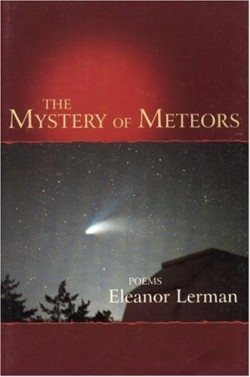
The Mystery of Meteors
Sidewalk cracks and black cats, propped-up ladders and umbrellas opened indoors: Superstition, like poetry, relies on the small fragments of the world for its magic. The latest collection from National Book Award nominee Eleanor Lerman —her first in more than two decades—takes on both at once, exploring the mysteries of occurrence through the careful derivation of language and form. The Mystery of Meteors examines the ways that knowledge is transmitted, translated, and applied. The speaker of these poems is persistently curious, gleefully looking for meaning in celestial bodies, ancient texts, witchcraft, religion, and science, always asking “over what do I have dominion?”
The poems in this collection are neither oblique, nor theoretical, relying on lived experience for their emotional subject. From love to travel, each verse is an inquiry into understanding one’s place in the ebb and flow of the universe. In “The Strange Attractor,” the speaker, stranded on a side road after an argument, attempts to translate personal chaos through the scientific theory of the Lorenz Attractor. “Will the love of my life come / back for me? Deep in the fluid dynamics of that fibrillating heart / will the other, the strange attractor, finally exert itself?”
The collection is rich with such seemingly dichotomous associations. In one poem, an eleventh century queen serves as the catalyst for a simple revelation, and in another, “Remote Viewing,” the speaker attempts reconciliation with a beloved by imagining her own ritual sacrifice. Though these poems chronicle the search for answers in uncanny places, Lerman suggests that the questions, the mysteries, offer more consolation than certainty ever could. Relationships between unexplained phenomena, from heartbreak to physics, serve as the inspirational crux of the book, providing a deep range of material that Lerman manages with grace and eloquence.
One of the book’s greatest pleasures is the ease with which Lerman switches her poetic lens. Her view is both broad and concentrated, finding equal brilliance in a daily event and a galaxy. She captures this scope in a vernacular that is decidedly unpoetic and mostly refreshing. She rustles up the language tossed around in American laundromats and offices, achieving an easy colloquialism that fails only when it strays too close to cliché or mediocrity. This may be the book’s only flaw. In The Mystery of Meteors, Lerman offers readers a world of un-ironic optimism, beautiful congruence, and a distinct voice that many are grateful to hear again, or for the first time.
Reviewed by
Jessica Belle Smith
Disclosure: This article is not an endorsement, but a review. The publisher of this book provided free copies of the book to have their book reviewed by a professional reviewer. No fee was paid by the publisher for this review. Foreword Reviews only recommends books that we love. Foreword Magazine, Inc. is disclosing this in accordance with the Federal Trade Commission’s 16 CFR, Part 255.
